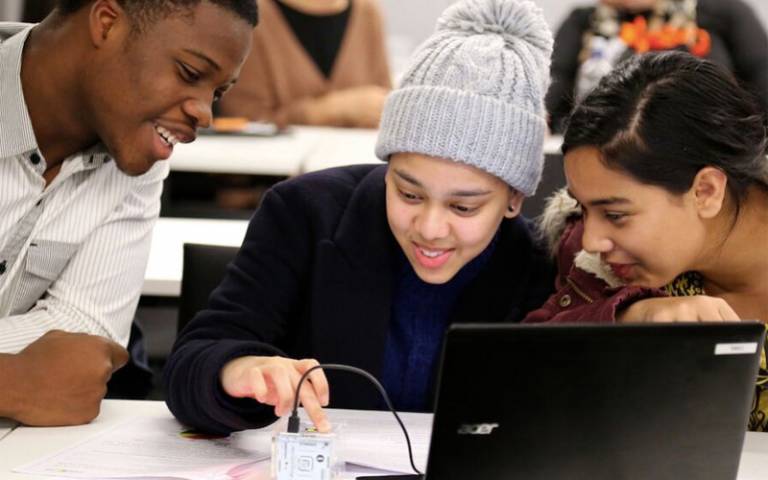Pioneering UCL Engineering 50:50 engagement strategy recognised by EngineeringUK
25 October 2018
An engagement strategy designed by the Faculty to encourage all school students to consider studying and working in engineering has received recognition from not-for-profit organisation EngineeringUK

Chosen as a case study for the Gender disparity in engineering briefing, the 50:50 Engineering Engagement Strategy was introduced by the UCL Engineering Engagement team in 2014. In the four years since, over 6,000 young people from more than 500 schools across London and the UK have connected with 600 plus UCL Engineering staff and students per year, through 134 different STEM engagement programmes.
The 50:50 Strategy saw existing engagement activities redesigned, and novel programmes developed, in order to demystify engineering and enable young people from all backgrounds to look past stereotypical views of who can become an engineer.
Despite women making up 50.7% of the total UK population, the briefing explains that only 16% of engineering and technology first degree entrants in the UK are female, and only 8% of engineering apprenticeship starters in England are women.
With 50% of girls undertaking GCSE physics, yet only 22% of young women going on to study physics at A-level, the EngineeringUK briefing highlights the clear discrepancy found when it comes to gender representation in engineering industry and education. It is this discrepancy which initiatives like the 50:50 Engineering Engagement Strategy aim to rectify.
Research by McKinsey, also cited in the briefing, estimates that £150 billion could be added to GDP forecasts by 2020, if “more women… work in high-productivity sectors like STEM.” Predictions suggest a current annual UK deficit of up to 59,000 people with A-level and above core engineering skills, underlining the importance of allowing half the population, and other underrepresented groups, to see engineering as a viable and welcoming career and study choice.
A UCL Engineering Engagement Team volunteer and young female pupils learn whilst having fun at the 'Change the World' Engineering Masterclass Series for East London schools.
Given this status quo, the 50:50 Strategy’s core goal is to strengthen and diversify the engineering workforce, by encouraging young people from all walks of life – and especially young girls - to consider career pathways not only in, but also inspired by, engineering.
Recognised both nationally and internationally, the Strategy encompasses a number of different engagement activities at varying levels, as well as CPD courses for teachers, plus relatable role models for pupils, aiming to instigate in all children and young people a sense that engineering is for them.
Dr Elpida Makrygianni, UCL Engineering’s Education Developer and Coordinator, notes that the strategy “was never just about getting a 50:50 gender balance. It was - and still is - about sending a strong message in the classroom, at home and to society about breaking down stereotypical messages that have created invisible barriers affecting young people’s confidence and career choices.
"Through sustained, meaningful engagement, pupils as young as four get to experience first-hand how engineers approach complex, real-world problems, and both girls and boys receive equal engineering education opportunities.”
This approach to engineering engagement has been recognised by EngineeringUK, who work to inspire young people into considering engineering careers. The 50:50 Strategy, which places a strong emphasis on all minority groups feeling included, saw overall female participation rates in UCL Engineering engagement programmes rise from 19% to 63% during 2014 to 2018. Increased involvement from BAME pupils was also recorded.
Mark Titterington, CEO at EngineeringUK, explains that the UK needs “many more engineers to close the employment shortfall”, with female under-representation in engineering meaning the UK is “missing out on great talent.” Mark also notes that, alongside this, “women are also missing out on exciting and impactful careers in engineering and [the possibility of] contributing solutions to some of society’s biggest challenges.
The EngineeringUK briefing ‘Gender disparity in engineering’ states that only 60% of girls aged 11 to 14 think they could become an engineer if they want to, compared to 72% of boys. This needs to change and for that to happen we need to do more to show girls, at the earliest age possible, how they can follow what they love through careers in engineering… Initiatives such as UCL’s 50:50 Engineering Engagement Strategy have a positive impact on young people’s knowledge of engineering jobs, particularly for girls.”
Academics, researchers and students from across the Faculty and UCL itself have given up their own time to ensure the success of the 50:50 Strategy, and all involved are delighted that the initiative “is featured in the briefing report and recognised by EngineeringUK as good practice in gender equality and inclusion,” Dr Makrygianni adds. More hard work is still needed, however, with Dr Makrygianni pointing out that there is a “long way to go before we meet any of the gender equality or diversity challenges in science and engineering.
The UCL Engineering Engagement Team designed the 50:50 Strategy with this in mind, recognising a need for real change in the system, settings and processes currently in place. We aim to create an inclusive and positive environment for all, enabling, inspiring and making young people feel a sense of belonging in engineering, thus allowing them to consider a STEM career as being for them. Sustained meaningful action and commitment to a strong consistent message in our everyday actions is required to ensure this shift in attitude develops and grows.”
 Close
Close

